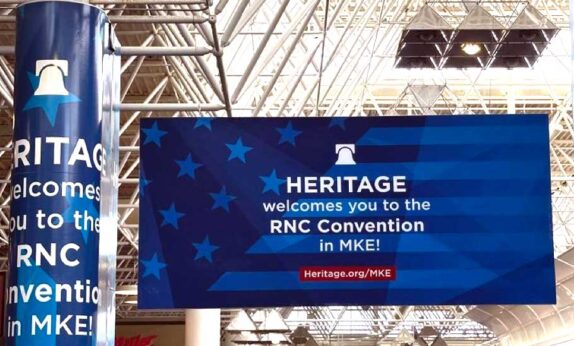
“This never happened before.”
Gail Ruzicka, an RNC delegate from Utah, expressed total disbelief when speaking to WISN ABC 12 on July 8. She was walking out of the meeting of the Convention Committee on Platform, which had just approved the new Republican Party platform for 2024.
An 81-year-old veteran of Phyllis Schlafly’s anti-feminist Eagle Forum who has helped craft every GOP election program since 1992, Ruzicka seemed genuinely shell-shocked after exiting the committee session.
“I’ve done this several times…. We always had subcommittees, where we could go in and work on a section of the platform, propose amendments, debate them, add them…. They didn’t allow any amendments. They didn’t allow any discussions!”
Of course, there wasn’t that much to debate or amend in comparison to previous years. This year’s Republican platform clocks in at just 5,380 words, a massive downsize compared to the 36,000-word manifesto of 2016 or the 31,000-word program of 2012.
In 2020, using the COVID-19 pandemic as an excuse, the Republican National Committee declined to issue any election platform at all, simply passing a resolution that said a new one would be drafted in 2024. Until then, GOP leaders said, “the Republican Party has and will continue to enthusiastically support the President’s America-first agenda.”
Whatever Trump says
Essentially, it was a declaration that the Republican Party stands for whatever Trump says or wants. No need for party members or GOP elected officials to think, the leader will handle that. The 2024 edition of the platform, while a bit wordier than the 2020 pledge of fealty, is an expansion on the same theme.
The right-wing National Review reported that delegates at the Convention Committee on Platform were not allowed to review the proposed document until the morning of the session when it would be debated and adopted. They were ordered to lock away their phones, electronics, and computers, and delegates were shadowed to the restroom to ensure there were no leaks of proceedings.
Trump campaign staffers in the room used signs to instruct committee members how they should vote on proposed motions. After only 45 minutes of such theatrics, however, there was a motion to simply call the question on the entire platform, effectively ending any further debate or discussion.
While the Republican Party has not been known for its democratic sentiments since Reconstruction, this tamping-down on discussions shocked even some of the most stalwart GOP convention delegates.
“They rolled us. That’s what they did,” Ruzicka observed. “I’ve never been treated so badly. To have them force this vote on us before we even had a chance to read this platform.”
Other delegates, however, seemed less troubled by being told to switch off their brains and follow whatever instructions the leader and his representatives gave them.
Kevin Marino Cabrera, 33, said the proceedings indicated “a unified party behind President Trump, who’s our nominee. Our platform reflects his views.” When asked if there was any contention behind closed doors, he responded, “It’s a stark contrast to the other side, where you see them scrambling today trying to decide whether or not they remove President Biden off the ballot.”
Concealing liabilities
What was Trump seeking to change about the GOP platform that delegates like Ruzicka found so contentious? Why the rush job on debate and discussion?
Some of the major alterations to longstanding Republican policy are clearly aimed at mitigating weaknesses Trump and the GOP face: widespread support among voters for protecting access to abortion and for marriage equality.
On abortion, there is a rhetorical backpedaling on the party’s stringent and well-publicized position. While the platform hints at the GOP’s longstanding belief that the 14th Amendment covers fetuses and embryos, it also declares states to be the arbiters of abortion law and pledges the party to support “policies that advance Prenatal Care, access to Birth Control, and IVF (fertility treatments).” Instead of the usual marquee position abortion has held in GOP election messaging, it is instead shuffled off to the category of being a state issue.
When it comes to marriage, there is only one mention of it in the platform. The Republican Party now says it will “promote a Culture that values the Sanctity of Marriage.” There is no condemnation of same-sex marriage, the destruction of which has long been a GOP goal; no mention is to be found of marriage being only between a man and a woman.
That was enough to get one conservative gay group to jump on board the Trump train. Charles Moran, president of the Log Cabin Republicans, called the new platform “inclusive.” He said: “It promotes the sanctity of marriage but doesn’t exclude our marriages. It supports IVF, which is the principal way same-sex couples build families.”

Moran’s words, and especially a statement issued by his group, suggested well-off gay men and lesbians are kicking the ladder down behind them after being given a spot in the MAGA coalition – the needs of working and poor queer people, and especially trans people, be damned.
“LGBT conservatives are more determined than ever before to help the GOP fight the radical gender ideology of the Democrat Party,” Log Cabin declared Monday, “and more enthused than ever to nominate President Trump as our standard-bearer and Make America Great Again.”
As for the religious fundamentalists who have made up the core of the GOP’s mass base for decades and for whom abortion and gay marriage are political litmus tests, media reports hyped the impression that they have been sidelined by Trump.
Indeed, any dissent they have about the way the GOP platform was adopted or what it notably omits has been officially silenced. Plans to contest the plans to strike the issues of abortion and marriage equality from the floor were swiftly pulled after the failed assassination attempt on Saturday.
And the fact that Trump was able to effectively run roughshod over two of the most cherished Republican platform items – homophobia and forced pregnancy – indicates his campaign knows full well that adopting such positions could cost him the election in November but that it doesn’t fear losing Evangelical votes.
Under the rug, for now
But does this mean that Trump has turned over a new leaf when it comes to such policies? According to the unofficial platform of the Heritage Foundation’s Project 2025 (an impressive 356,931 words in length), the answer is no.

Under the far-right blueprint, the FDA will ban abortion pills, and the federal government will use the Comstock Act to make sending them through the mail illegal. Additionally, there will be surveillance of all pregnancies, including those that end in miscarriage. Records will be kept of the states of residence of those seeking abortions, making it impossible for those in a state where abortion is illegal to travel out of state in order to seek medical care.
Additionally, the plan calls to “rescind regulations prohibiting discrimination on the basis of sexual orientation, gender identity, transgender status, and sex characteristics.” It furthermore equates “transgender ideology” with pornography, which it says should be banned, as it has no First Amendment utility.
Even though Trump claims to have rejected the master plan for his first 180 days in office, Heritage Foundation insiders say his public disavowal “is a PR gesture for him to provide himself maximum room to maneuver.” Indeed, the Heritage Foundation remains a key sponsor of the convention itself. On the first day of the convention, the think tank held a special ten-and-a-half-hour session titled “Heritage Policy Fest: Fighting for America’s Future.”
One leader, one party, one nation
This is the truth that lies under the surface of the Republican Party’s platform revisions, and it’s what makes the gambit to clamp down on intra-party dissent worthwhile for the GOP.
Knowing that they can lie to voters now and then do what they want in the aftermath of a successful Trump campaign means that the Republican leaders see it in their best interest to sweep open bigotry under the rug temporarily, even if it means upsetting a few long-term activists like Gail Ruzicka.
As the delegates assembled on the floor of the convention in Milwaukee Monday morning, they called out their unwavering commitment to Donald Trump; every single vote went to him. Some called him “my friend,” others went so far as to claim he was the greatest president in history.
Over and over again, delegates stressed “unity,” a theme taken up since the assassination attempt on Saturday and a term echoed by the White House, too, as it paused Biden’s re-election campaign. “Unity” was also the call from former Trump rivals like Nikki Haley, who is now scheduled to speak at the convention.
But what is it that the country is supposed to unite around?
Whether it’s the pared-down 16-page official GOP platform or the 887-page Project 2025 masterplan for a second Trump administration, it’s clear that big business and the far-right are trying to build “unity” around an agenda that is totally in their interests, not ours.










